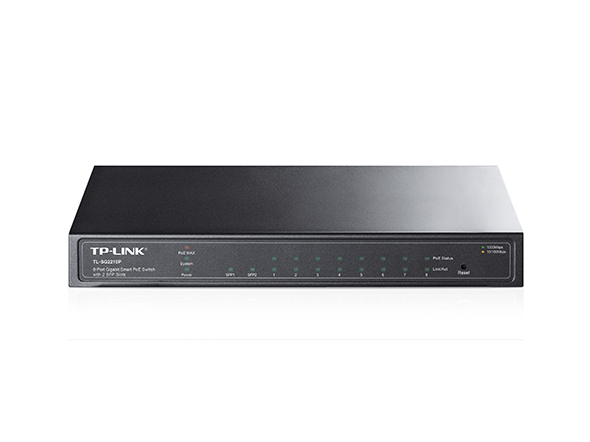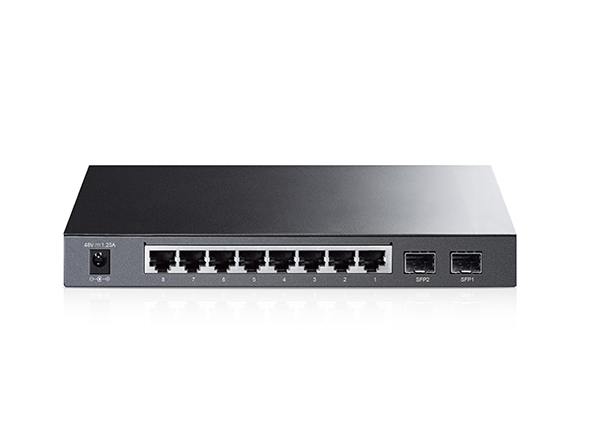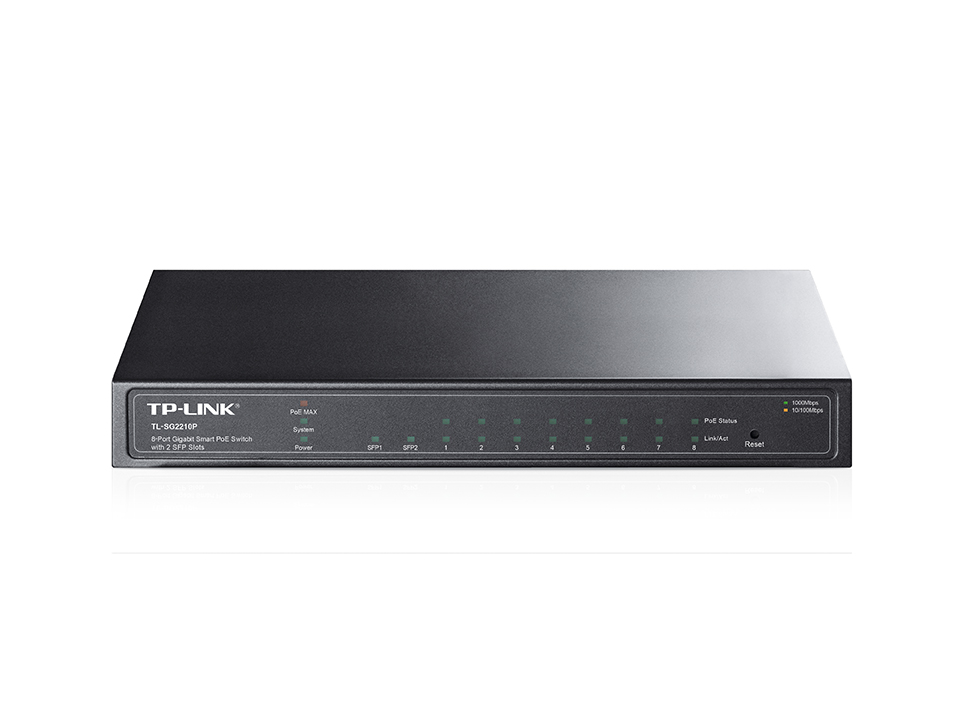TL-SG2210P
JetStream 8-Port Gigabit Smart PoE+ Switch with 2 SFP Slots
- Features 8 PoE+ ports, with total PoE power budget of 58W* and useful PoE power management features
- Gigabit Ethernet connections on all ports provide full speed of data transferring
- Integrated security strategy including 802.1Q VLAN, ACL, Port Security and Storm control help protect LAN area investment
- L2/L3/L4 QoS and IGMP snooping optimize voice and video applications
- WEB/CLI managed modes, SNMP, RMON bring abundant management features
- Innovative energy-efficient technology saves up to 50% of power consumption
What This Product Does
IEEE 802.3af/at-compliant Power over Ethernet
The TL-SG2210P supports 8 ports of IEEE 802.3af/at-compliant PoE and has a total power supply of 58W* to power any 802.3af/at compliant power device. It’s an efficient and cost-effective choice to work with wireless access points, surveillance cameras, IP phones, and other PoE-powered devices while getting rid of cables or power lines running around. Compact and flexible, the TL-SG2210P is ideal to flexibly use PoE to deploy wireless access points or IP-based network surveillance cameras for projects or small business networks.
Advanced QoS Features
To integrate voice, data and video service on one network, the switch applies rich QoS policies. The administrator can designate the priority of the traffic based on a variety of means including Port Priority, 802.1P Priority, and DSCP Priority, to ensure that voice and video are always clear, smooth and jitter-free. In conjunction with the Voice VLAN the switch supports, the voice applications will operate with much smoother performance.
Abundant Layer 2 Features
For more application of layer 2 switches, TL-SG2210P supports a complete lineup of layer 2 features, including 802.1Q tag VLAN, Port Isolation, Port Mirroring, STP/RSTP/MSTP, Link Aggregation Control Protocol and 802.3x Flow Control function. Any more, the switches provide advanced features for network maintenance such as Loop Back Detection, Cable Diagnostics, and IGMP Snooping. IGMP Snooping ensures the switch intelligently forward the multicast stream only to the appropriate subscribers while IGMP throttling & filtering restricts each subscriber on a port level to prevent unauthorized multicast access.
Enterprise Level Management Features
TL-SG2210P is easy to use and manage. It supports various user-friendly standard management features, such as intuitive web-based Graphical User Interface(GUI) or industry-standard Command Line Interface(CLI). SNMP (v1/2/3) and RMON support enable the switch to be polled for valuable status information and send traps on abnormal events.
*PoE budget calculations are based on laboratory testing. Actual PoE power budget is not guaranteed and will vary as a result of client limitations and environmental factors.
Related Cases
-
Soborka ISP
TP-Link Helps ISP Soborka Provide Better Service for Subscribers
Soborka ISP
TP-Link Helps ISP Soborka Provide Better Service for Subscribers
“TP-Link’s products offer tremendous value, which allowed us to reduce the cost of updating our large network without compromising performance. Our customers are much more satisfied with the network since the upgrade. It has done a lot to improve our reputation.” —Soborka's CEO
| HARDWARE FEATURES | |
|---|---|
| Standards and Protocols | IEEE 802.3i, IEEE 802.3u, IEEE 802.3z, IEEE 802.3ab,IEEE 802.3ad, IEEE 802.3af, IEEE 802.3at, IEEE 802.3x, IEEE 802.1d, IEEE 802.1s,IEEE 802.1w, IEEE 802.1q, IEEE 802.1p, IEEE 802.1x |
| Interface | 8 10/100/1000Mbps RJ45 Ports 2 1000Mbps SFP Slots (Auto-Negotiation/Auto MDI/MDIX) |
| Network Media | 10BASE-T: UTP category 3, 4, 5 cable (maximum 100m) 100BASE-TX/1000Base-T: UTP category 5, 5e or above cable (maximum 100m) 1000BASE-X: MMF, SMF |
| Fan Quantity | Fanless |
| Power Supply | 100~240VAC, 50/60HzExternal Power Adapter(Output: 53.5VDC/1.31A) |
| Power Consumption | Maximum (PoE on): 75.3W (220V/50Hz) Maximum (PoE off): 10.5W (220V/50Hz) |
| PoE Ports (RJ45) | Standard: 802.3af/at compliant PoE Ports: 8 Ports Power Supply: 58W* |
| Dimensions ( W x D x H ) | 8.2 x 4.9 x 1.0 in (209 x 126 x 26mm) |
| Mounting | Desktop / Wall-Mounting |
| Max Power Consumption | • V3.2: 76.5 W (220 V/50 Hz) (with 61 W PD connected); 10.3 W (220 V/50 Hz) (no PD connected)• V4: 74.4 W (220 V/50 Hz) (with 61 W PD connected)• V5: 77.8 W (110 V/60 Hz) (with 61 W PD connected) |
| Max Heat Dissipation | • V3.2: 261.02 BTU/hr (220 V/50 Hz) (with 61 W PD connected); 35.14 BTU/hr (220 V/50 Hz) (no PD connected)• V4: 253.89 BTU/hr (220 V/50 Hz) (with 61 W PD connected)• V5: 265.3 BTU/hr (110 V/60 Hz) (with 61 W PD connected) |
| PERFORMANCE | |
|---|---|
| Switching Capacity | 20 Gbps |
| Bandwidth/Backplane | 20 Gbps |
| Packet Forwarding Rate | 14.88 Mpps |
| MAC Address Table | 8K |
| Packet Buffer Memory | 512KB |
| Jumbo Frame | 9216 Bytes |
| SOFTWARE FEATURES | |
|---|---|
| Quality of Service | Support 802.1p CoS/DSCP priority Support 8 priority queues Queue scheduling: SP, WRR, SP+WRR Port/Flow- based Rate Limiting Voice VLAN |
| L2 and L2+ Features | • 16 IP Interfaces- Support IPv4/IPv6 Interface• Static Routing- 32 IPv4/IPv6 Static Routes• DHCP Server• DHCP Relay- DHCP Interface Relay- DHCP VLAN Relay• DHCP L2 Relay• Static ARP• Proxy ARP• Gratuitous ARP• Link Aggregation- Static link aggregation- 802.3ad LACP- Up to 8 aggregation groups and up to 8 portsper group• Spanning Tree Protocol- 802.1D STP- 802.1w RSTP- 802.1s MSTP- STP Security: TC Protect, BPDU Filter/Protect,Root Protect• Loopback Detection• Flow Control- 802.3x Flow Control• Mirroring- Port Mirroring- CPU Mirroring- One-to-One- Many-to-One- Flow-Based- Ingress/Egress/Both• Device Link Detect Protocol (DLDP)• 802.1ab LLDP/ LLDP-MED |
| Advanced Features | • Automatic Device Discovery• Batch Configuration• Batch Firmware Upgrading• Intelligent Network Monitoring• Abnormal Event Warnings• Unified Configuration• Reboot Schedule |
| VLAN | • VLAN Group- Max. 4K VLAN Groups• 802.1Q tag VLAN• MAC VLAN• Protocol VLAN• GVRP• Voice VLAN |
| Access Control List | L2~L4 package filtering based on source and destination MAC address, IP address, TCP/UDP ports, 802.1p, DSCP, protocol and VLAN ID Time Range Based |
| Security | SSH v1/v2 SSL v2/v3/TLSv1 Port Security Broadcast/Multicast/Unknown unicast Storm Control 802.1x and Radius Authentication、IP-Mac-Port-VID Binding、ARP Inspection、DHCP Snooping、DoS Defend |
| IPv6 | • IPv6 Static Routing and ACL• IPv6 Dual IPv4/IPv6• IPv6 Interface• Multicast Listener Discovery (MLD) Snooping• IPv6 neighbor discovery (ND)• Path maximum transmission unit (MTU) discovery• Internet Control Message Protocol (ICMP)version 6• TCPv6/UDPv6• IPv6 applications- DHCPv6 Client- Ping6- Tracert6- Telnet(v6)- IPv6 SNMP- IPv6 SSH- IPv6 SSL- Http/Https- IPv6 TFTP |
| L2 Switching Features | IGMP Snooping V1/V2/V3 802.3ad LACP (Up to 6 aggregation groups, containing 4 ports per group) Spanning Tree STP/RSTP/MSTP BPDU Filtering/Guard TC/Root Protect Loop back detection 802.3x Flow Control LLDP(LLDP-MED) |
| Management | Web-based GUI and CLI management SNMP v1/v2c/v3, compatible with public MIBs and TP-LINK private MIBs RMON (1, 2, 3, 9 groups) CPU Monitoring Port Mirroring Time Setting: SNTP Firmware Upgrade: TFTP & Web System Diagnose: VCT SYSLOG & Public MIBS |
| MIBs | • MIB II (RFC1213)• Bridge MIB (RFC1493)• P/Q-Bridge MIB (RFC2674)• Radius Accounting Client MIB (RFC2620)• Radius Authentication Client MIB (RFC2618)• Remote Ping, Traceroute MIB (RFC2925)• Support TP-Link private MIBs• RMON MIB(RFC1757, rmon 1,2,3,9) |
| MANAGEMENT | |
|---|---|
| Omada App | Yes, through• Omada Cloud-Based Controller• OC300• OC200• Omada Software Controller |
| Centralized Management | • Omada Cloud-Based Controller • Omada Hardware Controller OC300• Omada Hardware Controller OC200• Omada Software Controller |
| Cloud Access | Yes, through• Omada Cloud-Based Controller • OC300• OC200• Omada Software Controller |
| Zero-Touch Provisioning | Yes. Requiring the use of Omada Cloud-Based Controller |
| Management Features | • Web-based GUI• Command Line Interface (CLI) through telnet• SNMPv1/v2c/v3• SNMP Trap/Inform• RMON (1,2,3,9 groups)• SDM Template• DHCP/BOOTP Client• Dual Image, Dual Configuration• CPU Monitoring• Cable Diagnostics• EEE• SNTP• System Log |
| OTHERS | |
|---|---|
| Certification | CE, FCC, RoHS |
| Package Contents | TL-SG2210P Power Adapter Installation Guide Resource CD Rubber Feet |
| System Requirements | Microsoft® Windows® 98SE, NT, 2000, XP, Vista™ or Windows 7/8, MAC® OS, NetWare®, UNIX® or Linux. |
| Environment | Operating Temperature: 0℃~40℃ (32℉~104℉); Storage Temperature: -40℃~70℃ (-40℉~158℉) Operating Humidity: 10%~90% non-condensing Storage Humidity: 5%~90% non-condensing |






